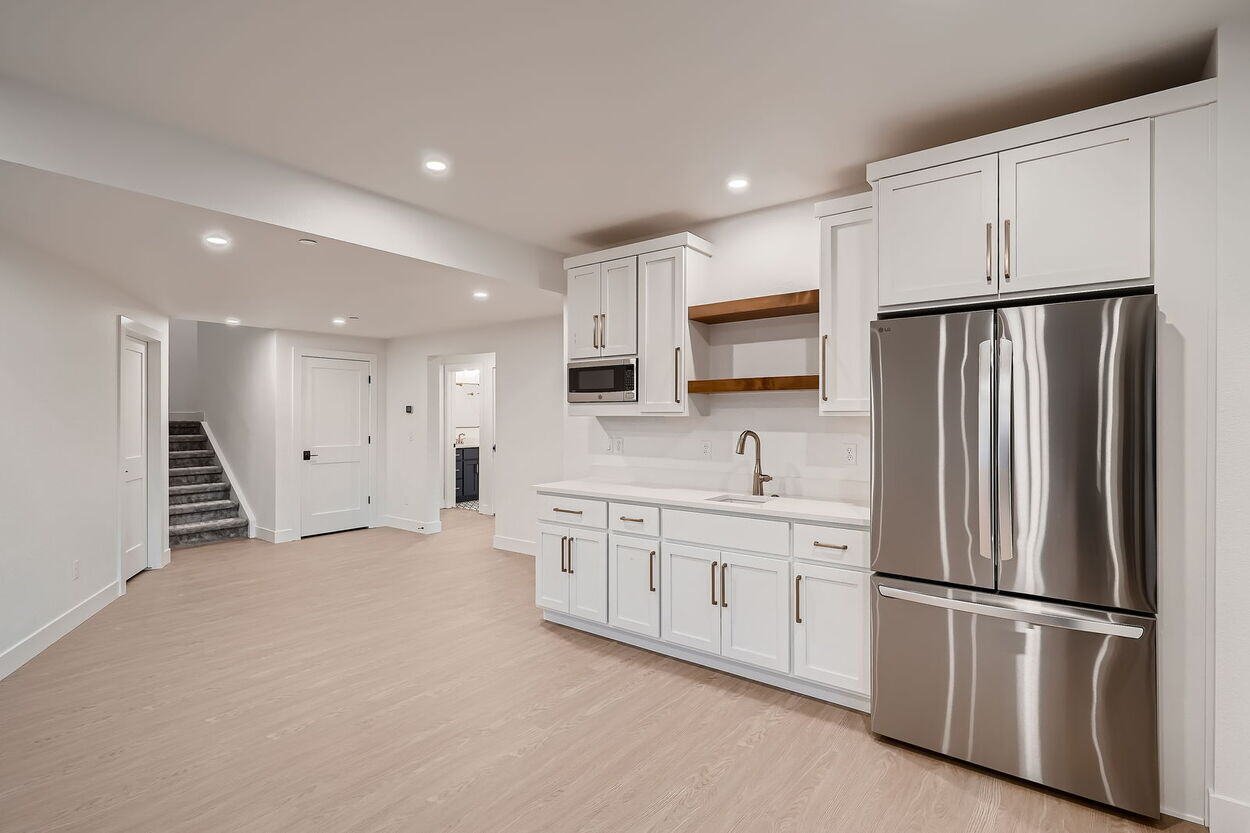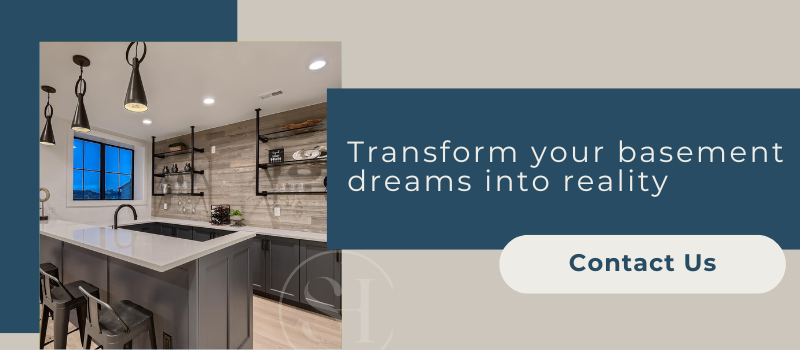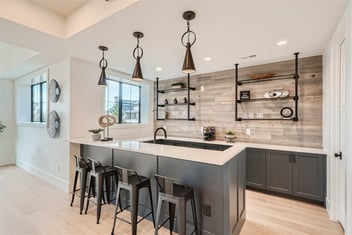11 Basement Finish Upgrades to Consider

Every basement finish starts with a spec sheet outlining in detail the finishes, features, and fixtures included in the base price of the project. A reputable company offering basement finishing in Denver offers quality specifications even at the base-pricing level. Inevitably, however, you will find items you may wish to upgrade either for aesthetic or performance-based reasons.
Which Basement Upgrades are Worth the Cost?
Some upgrades stand out as flashy and stylish, such as a swanky wet bar or a sleek, linear gas fireplace. Other basement upgrades may not even be visible to the naked eye, as they are tucked behind drywall or under the flooring, but are no less luxurious or worthwhile. The unseen basement finish upgrades not only add value in the long term but are also less costly to add before the basement is finished. For this reason, you may wish to consider giving a higher priority to the unseen upgrades now, adding others later, as budget allows.
Insulation
Adding insulation at the time of a basement finish is ideal, as walls and floor joists are already open. Insulation may be added throughout the entire finished area, or in only one room—for example, a theater room. Various types of mechanical room and exterior wall insulation are required by code, varying by municipality, and should not be considered an upgrade by your contractor.
- Ceiling Insulation – One of the easiest and least expensive upgrades, ceiling insulation provides a sound-dampening layer between the rooms in your newly-finished basement and those of the main-floor above. R-19 Fiberglass batts are typically installed in the floor joists before hanging the drywall panels.
- RC Channel – Resilient channel (referred to as RC channel) is made from thin, flexible strips of metal (typically steel), designed to fasten directly to the drywall studs. Drywall is then attached directly to the RC channel instead of fastening to the plywood studs, which decouples the drywall from the wall studs, creating an air pocket. This air pocket forms a gap in the path taken by sound waves. As long as the RC channels and drywall are installed properly, they work in tandem to dampen sound from surrounding areas by not allowing sound waves or vibrations to pass from studs to drywall.
- Mineral Wool Insulation – Thermafiber® SAFB™ (Sound Attenuation Fire Blankets) are mineral wool batts designed to provide acoustical control and fire protection in many different UL fire-rated wall and floor-ceiling assemblies. These products are non-combustible, moisture-resistant, non-corrosive, non-deteriorating, mildew and vermin-resistant—making them ideal for basement application. SAFB are fire resistant to temperatures above 2,000° F and contribute to credits in several green-building programs.
Flooring
As basements are prone to moisture and may have higher humidity levels than other parts of the home, the flooring selection should be made accordingly. The first two upgrades listed below fall into the “Seen” category of project enhancements; the latter two, “Unseen.” Either way, flooring is one upgrade worth considering if you have a specific look or feel in mind that is not reflected in your base specifications, as floor replacement presents a disruptive project to redo in the future.
- EVP / LVP Flooring – Though a somewhat pricey upgrade, environmental—or luxury vinyl plank flooring proves nearly impervious to water and scratches, making it an ideal choice for basement living space. With a look mirroring that of hardwood, and many colors, hues, and textures available, you’re sure to find flooring that complements your décor and enhances your space.
- Polished Concrete – Not for everyone, polished concrete creates a modern, industrial vibe. Flooring can be stained and/or polished to achieve a number of looks, and is long-wearing.
- Floor Leveling – If EVP flooring is on your list, you will most likely need to budget for floor leveling to some degree. If EVP flooring is installed over an uneven surface, the planks may not lock together properly, which results in problems in the long-term for the life of the floor.
- Carpet Pad – One of the more popular and less expensive upgrades, an upgraded carpet pad adds warmth and comfort underfoot—especially when the carpet is being installed over concrete. A typical base-level pad would be a 3/8” 6-pound pad, where an upgraded one would be thicker and denser (1/2” 8-pound). Some are even made of memory foam.
HVAC Equipment
If you live in an older home in the Denver Metro area, it may be time to consider replacing HVAC equipment when finishing your basement. Again, it’s easier to work on the home’s internal systems while the walls are still open. HVAC venting can easily be adjusted and rerouted, if necessary, before drywall is installed.
- Furnace or A/C – A new furnace or air conditioner could be a sensible upgrade to add, not only for the reasons listed above, but also for possible energy-efficiency rebates offered by some utility companies on newer models. At the very least, have the existing systems checked and serviced to ensure they are in good working order before starting the basement finish.
- Water Heater – While not a particularly chic enhancement, a new water heater could save gallons of grief down the road, should your existing older water heater spring a leak post-basement finish. Another option is a tankless water heater, which can easily be installed at the early stages of the basement finish. Maybe you just want a larger water heater than your current model? Installing one before the start of construction is immeasurably easier than waiting until the area surrounding the mechanical room is finished.
Electrical
Perhaps some of the most commonly-added enhancements, electrical upgrades—both standard and low-volt—pack a punch for the money spent. While your project spec sheet will certainly outline many electrical inclusions, read it carefully to determine exactly what is and is not included. Plan to walk the project with the electrician(s) at the rough frame stage to discuss any upgrades you may wish to add. Some electricians do both standard and low-volt wiring; others specialize in either/or.
- Standard Electrical – Determine how many recessed can lights are included in your bid, discuss placement, and then decide if more are needed. Do you want dimmer switches on any circuits, or certain lights on specific switches? If you plan to install workout equipment, you will need a 20-amp power outlet for each machine. Likewise, bar refrigerators require higher-amp outlets, as well. What about under-cabinet lighting, ceiling fan installation, or high outlets for TVs? Talk through all of these details at the electrical walk, with a clear understanding of what is included and what is considered an upgrade.
- Low-Volt Electrical – With the importance of WIFI connectivity and home security—not to mention entertainment equipment set-up, the low-volt electrical plan plays an important role in both productivity and enjoyment for your new basement space. As with the standard electrical, examine your spec sheet to determine what is included in your project. Let your basement plan dictate the low-volt requirements, i.e., if you have a large entertainment area, you may wish to add surround-sound wiring. If your new basement will be the location of your new office, then be sure to allow for sufficient internet, computer, and printer connections.
Basement Finishing in Denver
When you’re ready to make plans to finish your basement, we’ve got the team in place to deliver a space you’ll love and live in for years to come. Our standard specifications are of high quality, but if you choose to add upgrades, we’ll guide you in selecting those that work best for your design and budget. As a custom home builder in Denver for nearly 50 years, we have the experience, expertise, and established trade relationships to build a basement you can’t wait to come home to! Call us today, and let’s get started: 303-848-8417
Contact Us
Contact us today for a consultation or to learn more.
/Sheffield_Logo_Horizontal_Reversed.png)



